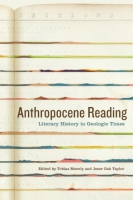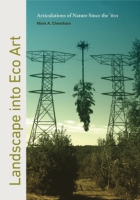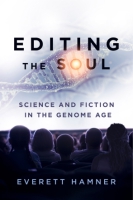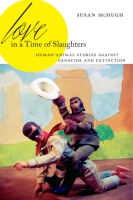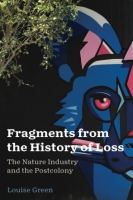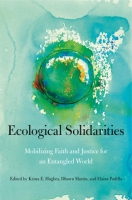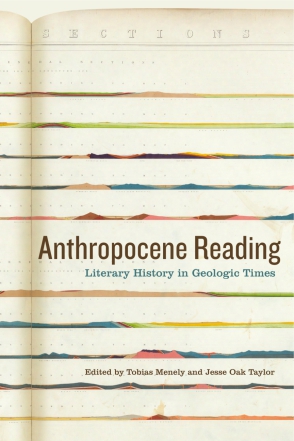
Anthropocene Reading
Literary History in Geologic Times
Edited by Tobias Menely and Jesse Oak Taylor
Anthropocene Reading
Literary History in Geologic Times
Edited by Tobias Menely and Jesse Oak Taylor
“Anthropocene Reading demonstrates why the era of what some are also calling the ‘Great Acceleration’ reaches into and affects so many fields, sciences, and disciplines.”
- Description
- Reviews
- Bio
- Table of Contents
- Subjects
Entering into conversation with geologists and geographers, this volume reinterprets the cultural past in relation to the anthropogenic transformation of the Earth system while showcasing how literary analysis may help us conceptualize this geohistorical event. The contributors examine how a range of literary texts, from The Tempest to contemporary dystopian novels to the poetry of Emily Dickinson, mediate the convergence of the social institutions, energy regimes, and planetary systems that support the reproduction of life. They explore the long-standing dialogue between imaginative literature and the earth sciences and show how scientists, novelists, and poets represent intersections of geological and human timescales, the deep past and a posthuman future, political exigency and the carbon cycle.
Accessibly written and representing a range of methodological perspectives, the essays in this volume consider what it means to read literary history in the Anthropocene.
Contributors include Juliana Chow, Jeffrey Jerome Cohen, Thomas H. Ford, Anne-Lise François, Noah Heringman, Matt Hooley, Stephanie LeMenager, Dana Luciano, Steve Mentz, Benjamin Morgan, Justin Neuman, Jennifer Wenzel, and Derek Woods.
“Anthropocene Reading demonstrates why the era of what some are also calling the ‘Great Acceleration’ reaches into and affects so many fields, sciences, and disciplines.”
“Though responding to a single challenge, the essays vary immensely, but it is pleasant to see all contributors thinking creatively and tentatively, sometimes driven to the esoteric extremes from which only critical neologisms can rescue them. The experiment is interesting and obviously relevant for critical theory in a changing world.”
“A rich collection of essays, their span befitting the scale and diversity of an Earth being transformed. Ranging as it does from the crowded present into deep time, where the most immediate and personal of human stories intermesh with planetary narrative, Anthropocene Reading is a deeply thought-provoking volume.”
“An ambitious and exhilarating collection. It takes the Anthropocene debates well beyond their familiar terrain. The book will appeal to readers from a host of disciplines, from geology to history, geography, and literary studies.”
“The hypothesis of the Anthropocene as forwarded by earth scientists registers a moment of ecological crisis and an unavoidable challenge to critical and historical practice in literary studies. This collection of experimental forays meets that challenge with radical—and welcome—new approaches to the archives of the human age. Both erudite and engaged, the contributors offer essential scholarship for the years to come.”
“Elaborating on Dipesh Chakrabarty’s linking of human and earth history in the Anthropocene, the editors frame this scintillating volume by asserting that we humans now read our ‘transformative presence in the Earth’s strata,’ that is, paradoxically both changing and interpreting the Earth’s structures. Skills for textual analysis are thus crucial. With ecocritical voices debating the possibilities—and horrors—of the Anthropocene, Anthropocene Reading is a major contribution to ecocriticism and a delight to read.”
“All told, the 13 contributions offer varied and stimulating studies displaying how literary methods can effectively interrogate, reframe, and explicate the multi-faceted qualities and character of the Anthropocene.”
Tobias Menely is Associate Professor of English at the University of California, Davis, and the author of The Animal Claim: Sensibility and the Creaturely Voice.
Jesse Oak Taylor is Associate Professor of English at the University of Washington in Seattle and the author of The Sky of Our Manufacture: The London Fog in British Fiction from Dickens to Woolf.
Contents
Introduction - Tobias Menely and Jesse Oak Taylor
1 Anarky - Jeffrey Jerome Cohen
2 Enter Anthropocene, Circa 1610 - Steve Mentz
3 The Anthropocene Reads Buffon; or, Reading Like Geology - Noah Heringman
4 Punctuating History Circa 1800: The Air of Jane Eyre - Thomas H. Ford
5 Romancing the Trace: Edward Hitchcock’s Speculative Ichnology - Dana Luciano
6 Partial Readings: Thoreau’s Studies as Natural History’s Casualties - Juliana Chow
7 Scale as Form: Thomas Hardy’s Rocks and Stars - Benjamin Morgan
8 Anthropocene Interruptions: Energy Recognition Scenes and the Myth of Global Cooling - Justin Neuman
9 Stratigraphy and Empire: Waiting for the Barbarians, Reading Under Duress - Jennifer Wenzel
10 Reading Vulnerably: Indigeneity and the Scale of Harm - Matt Hooley
11 Accelerated Reading: Fossil Fuels, Infowhelm, and Archival Life - Derek Woods
12 Climate Change and the Struggle for Genre - Stephanie LeMenager
13 Ungiving Time: Reading Lyric by the Light of the Anthropocene - Anne-Lise François
List of Contributors
Index
Also of Interest
Mailing List
Subscribe to our mailing list and be notified about new titles, journals and catalogs.
